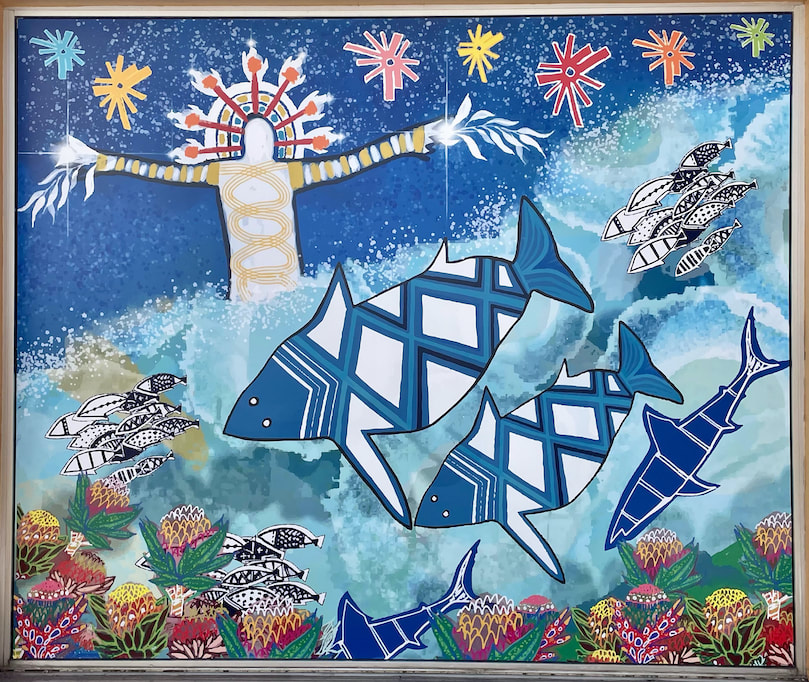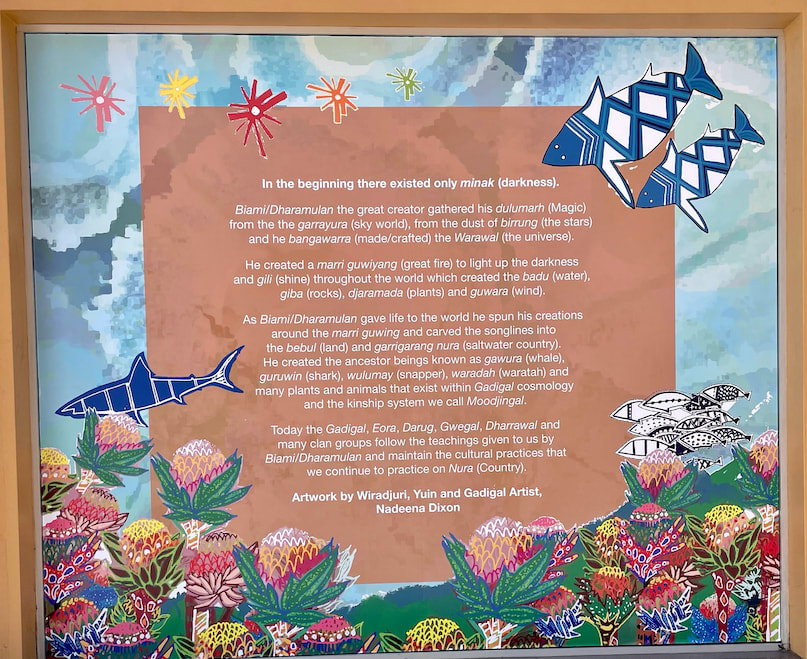The core aspect of justice for First Nations peoples, as for any oppressed peoples, remains empowerment. As Chelsea Watego put it strikingly in her book Another Day in the Colony, ‘Fxxx hope. Be sovereign’. Chelsea thus deliberately took up the ideological position articulated so powerfully by Aunty Rosalie Kunoth-Monks in her ABC Q & A response in 2014. ‘I have never left my country not have I ceded any part of it’, Aunty Rosalie said, ‘No one has entered into a treaty or talked to me about who I am. I am not the problem.’[2] Rather the real problem of justice lies with folks like me: whitefellas. It is not Aboriginality that is problematic but whiteness, which often is hardly examined – and one key element is unexamined Faith. It is therefore not enough for Churches to stand up for justice. We also have to examine our own privileges, our own power, and our own unconscious perspectives. We must address our own colonialism, embedded so deeply as it is, in our language, forms and expressions of faith.
Our contemporary reading this morning, Maranatha Australis[3], expresses this. In Jamie Dunk’s words:
Did we need to come through slaughter.
Savage, and then civilise,…
We are not our fathers but our past overflows.
It boils with forgetful praise from pulpit, from parliament,
It is in our blunt hearts and silted lungs and tarred songs.
We pine for christendom,
That bastard state.
The poet is saying is that it is not simply that violence has been inflicted but that whitefellas carry on that violence, in the very ways we act and speak, and the structures, literal and otherwise, of our society. Voting for the Voice alone, or even for a Treaty, will not end colonialism. We must go deeper.
the imperial mind
Reflecting on my own native land’s history, I see how successful was the development of what we might call the ‘imperial spirit’ and ‘colonial mind’. For firstly the Romans invaded and left behind their own imperial impositions: so powerfully in language and culture, and other constructions. Then the Normans came and, in a sense, they have never really left, imposing their law and language, taking the land and bequeathing a political and cultural legacy of conquest, plunder and exploitation: beginning infamously by ‘harrying the north’, seeking to crush resistance by obliterating in my birth lands every house, every field, every animal between York and Durham; and then spreading further into Wales and Ireland, and then further afield, even to the furthest stretches of the globe. Meanwhile, Roman and Norman cultures, and their associates, nurtured Western forms of Faith which mirrored and buttressed their imperial interests and outlooks. This, as the poet says, is what was brought as the Gospel to these lands. This is the air we inherit and still breathe.
The poet, and still more, Jesus, in today’s Gospel reading,[4] invite us to step back, and breathe afresh. If Christian Faith is to live in these lands of Australia – note well, a term of Latin derivation, thanks to Roman imperialism – then we need to start again. We must finally shake off our addiction to the ideals of Christendom, ‘that bastard state.’ It is hard to do. Happily, the Uniting Church has taken some steps forward, not least in establishing the Covenant with the Uniting Aboriginal & Islander Christian Congress (UAICC) and in beginning to recast our theology in the Preamble to the Constitution. However, as Garry Deverell kindly but firmly expressed it in his recent Reflection here, there is still a long way to go. It is not just that we must face core challenges of ‘land back;’ and ‘paying the rent’. We must also recast how we speak of the Gospel and worship Christ.
recognising our own coloniality
Whilst our Reformed Christian tradition rejected aspects of medieval Christendom, it also essentially replaced them with its own vision of a ‘godly commonwealth’. Like other Faith traditions, it brought its own patterns of thought and practice here: landing, as one of my Aboriginal priest friends puts it, like ‘stale bread’ on the first fleets, to feed these lands and peoples. For all the treasures of this building, just look around you right now. What do you see? I see many fine things, as well as people, but also a very colonial building: indeed, very English, with classical, Graeco-Roman, features. I see plaques, some less overblown than others, to some very able, entrepreneurial figures, but almost all very Anglo-Celtic, male, and colonial. As I entered this place today, it was not only from a street paved above the indigenous land, but via steps which lifted me even higher. Yes, our Congregationalist forebears avoided bringing some aspects of the sky God from European cultures. Nor did they build as high as the Anglicans, never mind the Catholics, or even the Presbyterians. Yet they built up over the earth, and they emphasised other understandings of the Spirit than those already here. How far do we continue along that pathway?
Now do not misunderstand me. I am not saying that this building and traditions are not valuable. I am simply sharing some of the physical perceptions and symbolism which are not only felt by others but which, if typically unconsciously, also shape us. For if we are to do justice, love mercy, and walk humbly with God – the God of this land – then we cannot simply graft First Nations people and understandings upon us. It is we who have to be re-grafted. Garry Deverell calls this reworking the theology of kenosis, sometimes known as divine self-emptying or pouring out, and embodied most powerfully scripturally in the so-called kenosis hymn of Philippians 2 verses 5-11. At our Synod’s Walking Together conference he challenged us to put this at the heart of our response.
Justice for First Nations peoples is not the only justice challenge. This church community has always stood for other causes and we will continue to pray and act for them. Refugee advocacy, and, above all, Earthweb concerns, are therefore other key items of our emerging Pathways Plan. Yet Walking Together with First Nations Peoples must become central and our Church Council warmly invites everyone to be a part of this journey. For this is about a deeper relationship with this place and its peoples and about our own spiritual transformation. It is far more than putting the Statement from the Heart on our walls. It is about it living and being embodied in our hearts and lives. It is about decolonising our own minds and liberating our Faith.
Jesus and decolonising our minds and lives
Note well what Jesus does at the beginning of their ministry, according to Luke’s Gospel. Jesus stands in the synagogue, the holy and treasured place of their own community, and proclaims a prophetic word from scripture. Why? And why choose Isaiah? The result, according to Luke, is that Jesus is rejected. Was it because Jesus was not sufficiently complimentary to the synagogue and its particular traditions? After all, choosing such a prophetic text was likely to rile some feelings, particularly in that community’s colonial context. Or was Jesus also ultimately rejected because he spoke a very uncomfortable, and very inconvenient, truth about, and to, power in the community? I think Jesus rattled the cage. Like First Nations leaders today, Jesus was inviting the oppressed and marginalised to claim their sovereignty, the divine sovereignty which is expressed in the Bible’s great prophetic words, and not least in Isaiah. As some scholars have put it, Jesus was thus declaring God’s ‘Nazareth Manifesto’. Yet I think there is more. Jesus was not only calling the oppressed to be empowered. Jesus was also challenging others, the more comfortable, those with some privilege and power – that, in our context, is me by the way, and many of us here, and whitefellas in general. For Jesus was inviting everyone to decolonise their minds, their lives and their faith.
Seeking justice is not as easy as it sometimes sounds. As Garry Deverell gently challenged us a few months ago, we progressive whitefella Christians can easily become like Pharisees: full of good aspirations but a little self-righteous where costly commitment is lacking. For that is kenosis: not cheap grace. Genuinely Walking Together with First Nations Peoples, and with others seeking justice, is a demanding journey, involving self-emptying, and a pouring out of our lives and resources.
Let me conclude. About the time this building was built, back in my native land, the British elite rediscovered the fearsome, but very tragic, Boudicca, the best known of all British indigenous resistance fighters against Roman imperialism. Money was raised for her statue, finally set up by Westminster Bridge, including by Queen Victoria whose own statue in Sydney stands but a stone’s throw from here in the centre of this city. For Boudicca was seen as symbol of British victory, and an inspiration to British imperial warrior culture. She was, in other words, coopted by imperialism, like so much else that is otherwise valuable in British and other cultures, including the Gospel and Christian Faith. However, like all great resistance fighters, Boudicca is not so easily coopted or contained. Like Jesus, such fragments of liberating life can speak to us afresh. Our own histories and traditions are not monolithic. All our cultures carry seeds of resistance and renewal, just like the Bible and our Faith tradition. We have to sieve them however, and choose, like Jesus, what to draw upon: if, as the poet says, Christ is indeed to come in a new way in these lands now called Australia. Above all, we have first to listen to this country itself and its peoples, and to all the oppressed whom God calls into empowerment. In this, we will walk together on pathways of healing and justice. In the name of Christ, known for tens of thousands of years in the names of this place and its peoples. Amen.
by Josephine Inkpin, for Pitt Street Uniting Church, 22 January 2023
[1] following the reading of the Uluru Statement from the Heart by leading First Nations people
– at https://www.youtube.com/watch?v=wmQwqwW4Lt0
[2] https://www.youtube.com/watch?v=birnA3_tm5E
[3] https://the12daysofchristmas.wordpress.com/resources/new-poetry/jamie-dunk-maranatha-australis/
[4] Luke 4.16-21


 RSS Feed
RSS Feed